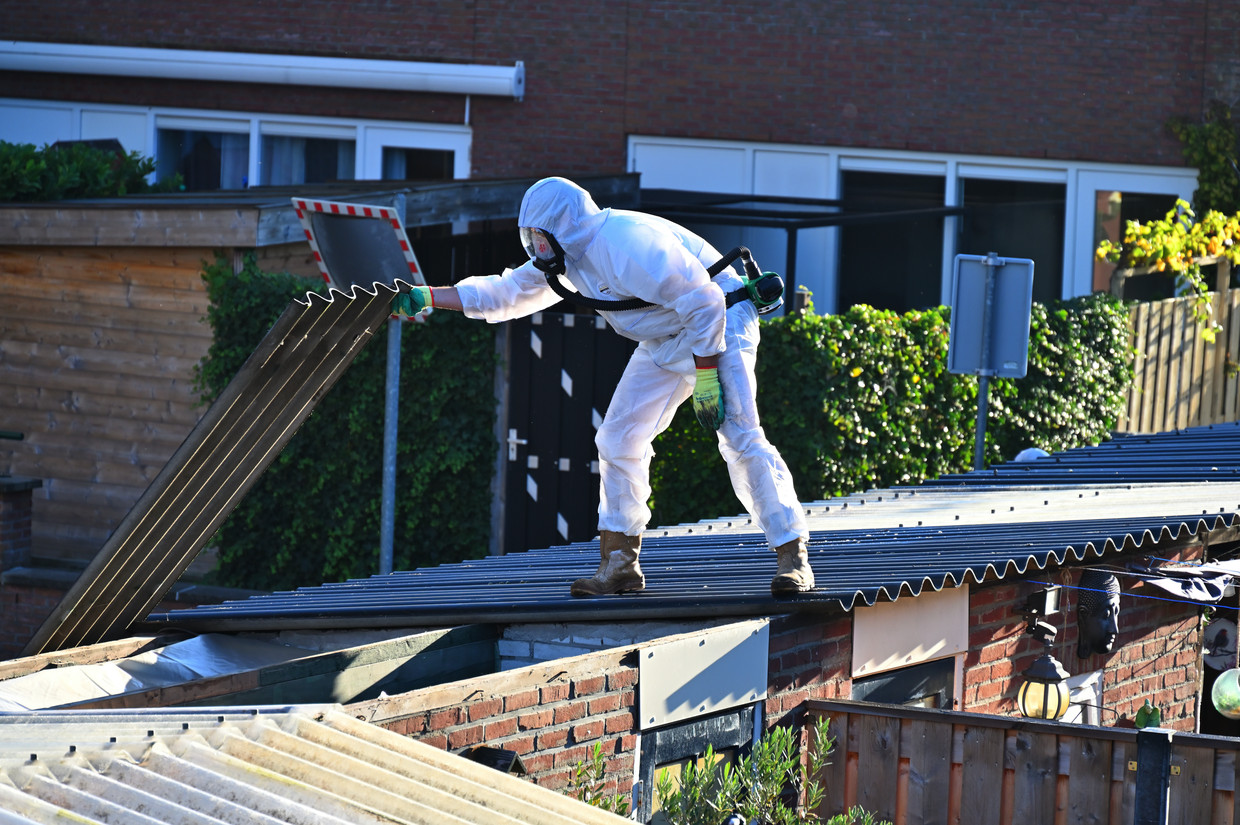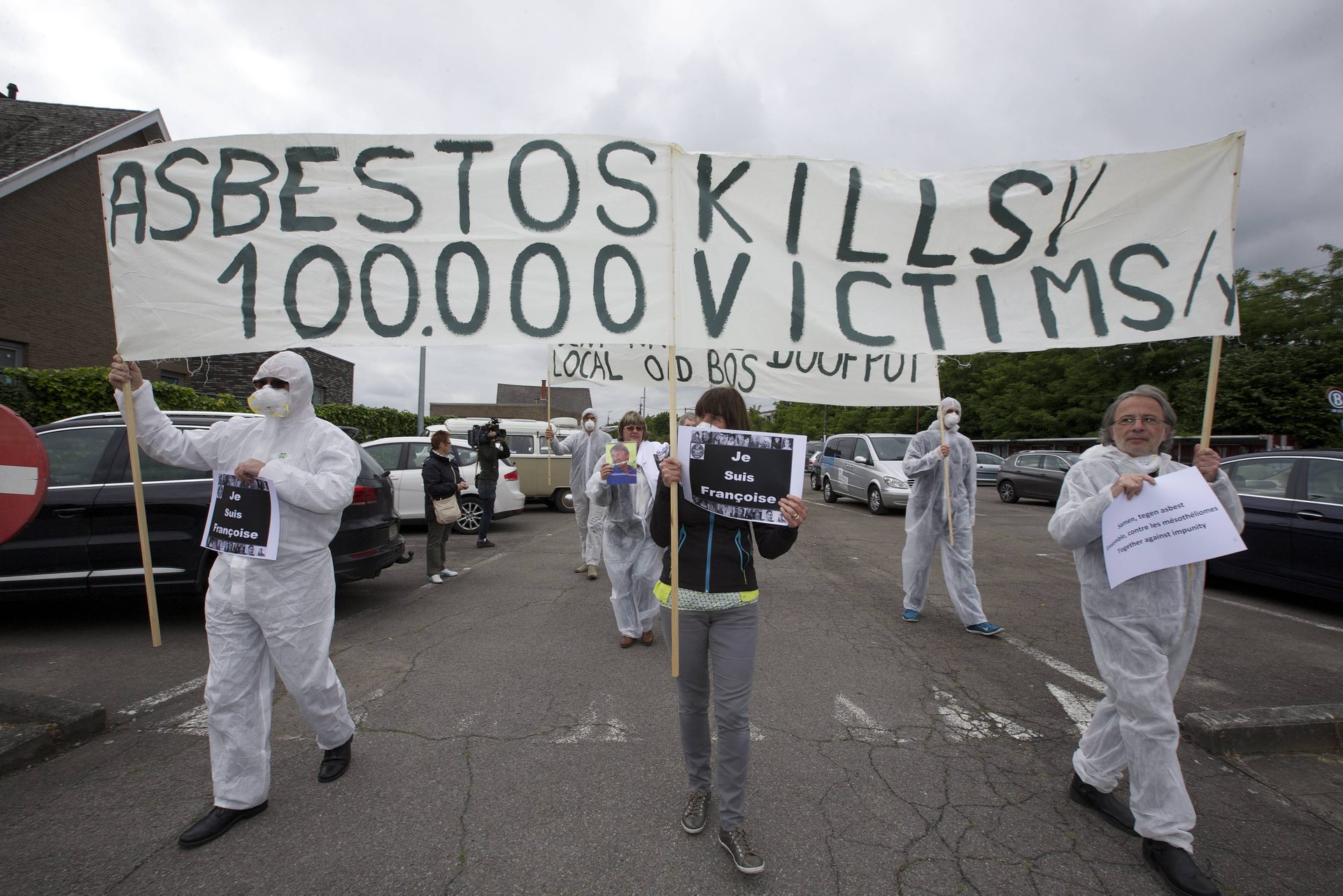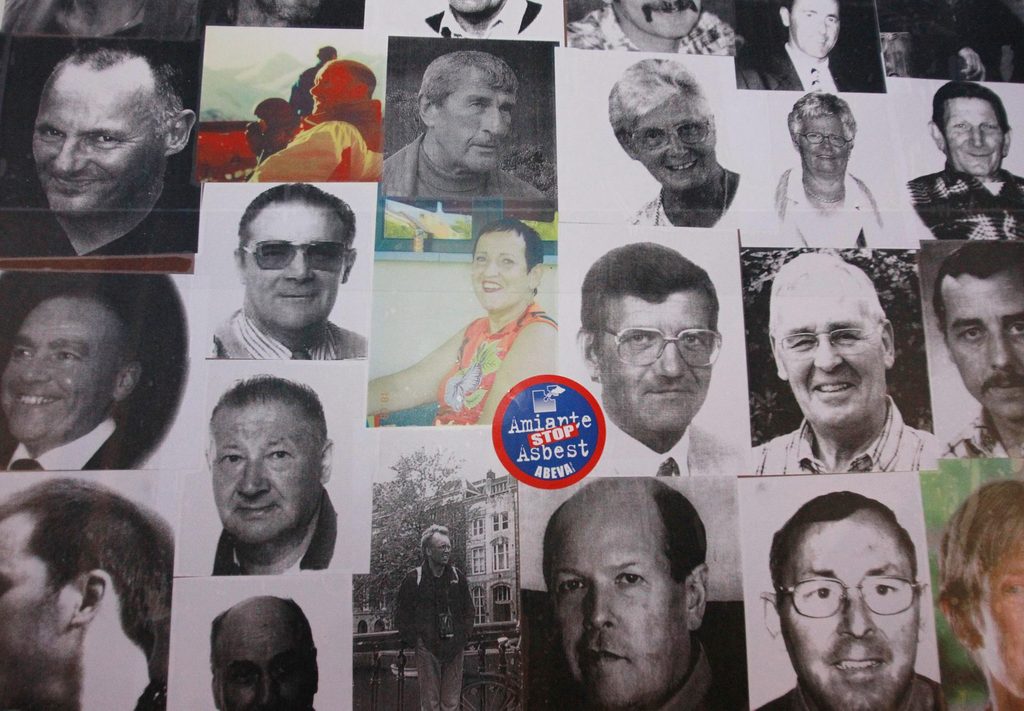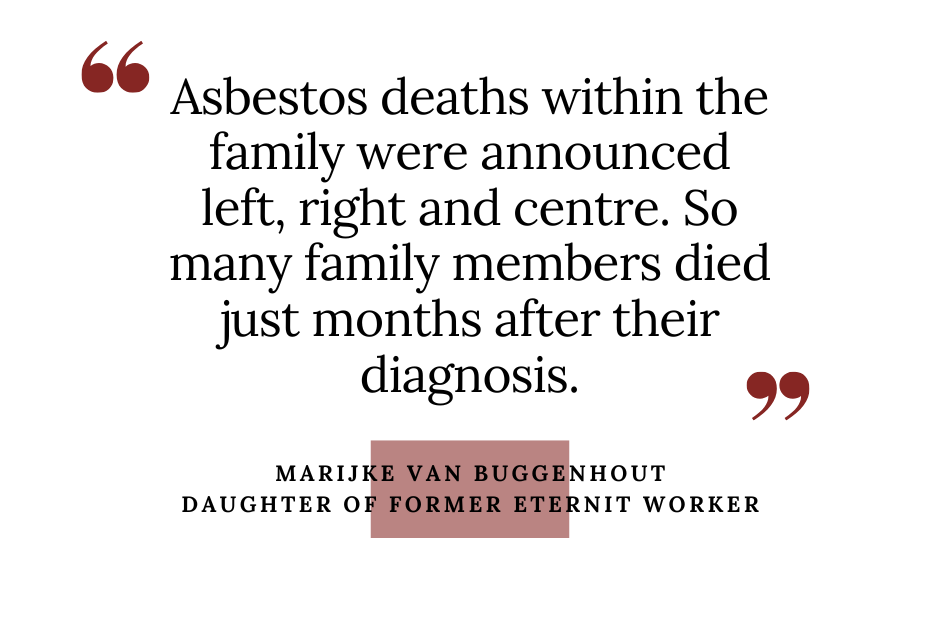The small rural village of Kapelle-op-den-Bos in Flanders was once home to a large asbestos factory that provided jobs and security for many – but was, at the same time, contaminating locals with toxic carcinogens.
The Belgian company Eternit (now Etex Group) made its fame and fortune during the 20th century by producing asbestos cement, which was hailed as a magic mineral for corrugating roofs due to its flexible and cheap nature.
Despite scientific evidence about exposure to asbestos and deadly diseases, including terminal cancer mesothelioma, having been first published in 1907, Eternit has always argued it was unaware of the risks of exposure for workers and citizens in the regions where the factories were located.
Instead of working towards justice and reparation, the company minimised the dangers of its products for years, lobbied against restrictive legislation and swept any damaging information under the rug.

Roofs containing asbestos are removed from a shed. Credit: Belga
Eternit only stopped using asbestos in its Flemish factory at the end of the 20th century after a ban was imposed, but by that point, the damage was done. Meanwhile, Eternit moved its factories from Europe to India, where the asbestos story continued.
While it has been illegal to manufacture, trade or reuse materials containing asbestos in Belgium for almost 30 years, asbestos-containing materials are still present in many homes built in the 60s and 70s. Belgium was one of the largest per capita consumers of asbestos. Globally, asbestos continues to kill 255,000 people a year to this day.
Never-ending fear
The company had a huge impact on people's life. Marijke Van Buggenhout, a PhD researcher in criminology, grew up near Kapelle-op-den-Bos at the end of the so-called "asbestos era" in Belgium, with her father who worked for decades at Eternit.
"Asbestos deaths within the family were announced left, right and centre: my father's Uncle Alex, his aunt Bertha, my father's aunt's daughter-in-law, the husband of my grandfather's youngest sister. They all died just months after their diagnosis," she told The Brussels Times.
At the time, and even now, many locals saw the company's influence as a positive, as it brought prosperity to the region and "ostensibly" took good care of its employees, meaning that if ever the problem was discussed, it was done so "cautiously."
"For me, the realisation of how widespread the health risks are only hit home after my father, who was exposed to asbestos fibres for two decades during his career, was diagnosed with mesothelioma," Van Buggenhout said.
Her family's story is not a unique one. Many of Eternit’s factory workers ("professional victims"), as well as their spouses and children (named "para-professional victims") and inhabitants of the village (so-called "environmental victims"), died as a result of asbestos exposure.
"We live in fear that new cases might come to light: My mum was not only exposed in a para-professional way, but she and her two brothers also played at asbestos dumps as children." The incubation time is time long — sometimes more than 40 years after exposure — and uncertainty remains about who could be the next victim.
False sense of justice
In 2011, a Belgian court for the first time ruled Eternit was at fault for continuing to use asbestos and consciously playing down the dangers, finding it liable for compensation of €250,000. However, in the Court of Appeal, it was reduced to €25,000.
For its part, Eternit has always maintained that no fault could be attributed to the company, arguing that the dangers of asbestos were not clearly determined at the time of the events.
On its website, it states that it "deeply regrets that (former) employees still develop mesothelioma today," but argued that it has taken several steps to mediate the damages, such as setting cooperating with the local authorities to clean up private sites where asbestos fibres were measured and developing a scheme to compensate mesothelioma victims.

People protesting near the entrance of the plant of asbestos manufacturer Eternit in Kapelle-op-den-Bos. Credit: Belga/ Nicolas Maeterlinck
However, the financial support given to victims is described by affected families as hush money: unofficial compensation that was offered under the table with an agreement that recipients would not bring legal action.
In 2006, the Federal Government set up an Asbestos Fund to systematically compensate victims. While this was considered a major recognition of the gross injustice experienced by victims, the Belgian Association of Asbestos Victims (ABeVA) was critical of this development.
The main issue relates to the lack of liability embedded in the immunity clause, which automatically certifies that once the victim accepts the compensation, they give up the legal right to sue their former employer.
"That immunity clause leaves victims in the lurch because they cannot fight for justice," Van Buggenhout noted. Only when the damage was inflicted by intentional fault can the immunity be waivered.
Related News
- 40% of houses in Flanders likely contain asbestos
- European Commission proposes much tougher asbestos exposure standard
Two ABeVA members are now working on a new lawsuit to improve the fund's mechanism by proving this intentional fault with the hope of breaking the immunity of companies such as Eternit, ensuring these multinationals have to answer to a judge and guaranteeing that the polluter also becomes the payer.
Van Buggenhout said the recent news that American company 3M has been ordered to compensate several members of a family whose blood was contaminated with PFAS as a result of its activities shows that "multinationals are not untouchable."
On Sunday, she will run the 20km of Brussels to support ABeVA and raise money for victims and the lawsuit, as well as awareness of this forgotten killer.


